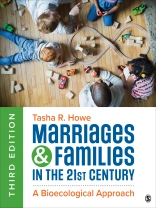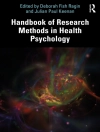In
Marriages and Families in the Twenty-First Century: A Bioecological Approach, Tasha R. Howe′s unique micro-to-macro perspective invites all readers to explore the full complexity of contemporary relationships and family structures within their ever-changing social, cultural, psychological, and biological frameworks. The illuminating narrative leads students into the future of the field by uniting the latest developmental science with everyday examples that place the individual within the context of family, peers, neighbors, teachers, schools, media, religious institutions, and culture. The
Third Edition encourages students to analyze and apply the material with abundant self-reflection exercises, self-assessments, case studies, and critical-thinking questions, providing them with a firm grasp of the research as well as concrete tools to use in their own lives, relationships, and careers.
İçerik tablosu
Chapter 1: The Changing American Family
Chapter 2: How We Study the Family: Theories and Research Methods
Chapter 3: Sex and Gender
Chapter 4: Sexualities
Chapter 5: Dating and Mate Selection
Chapter 6: Love
Chapter 7: Marriages and Committed Partnerships
Chapter 8: Living Single
Chapter 9: Reproduction and Parenting
Chapter 10: The Economy of Working Families: Balancing Mental, Physical, and Financial Health in the 21st Century
Chapter 11: Families in Crisis: Violence, Abuse, and Neglect
Chapter 12: Divorce and Remarriage
Chapter 13: Growing Older in Families
Chapter 14: The Evolution of Families in the 21st Century
Glossary
References
Index
About the Author
Yazar hakkında
Tasha R. Howe, Ph D, is a developmental psychologist and Professor of Psychology Cal Poly Humboldt. She specializes in developmental psychopathology, parent–child relationships, and family violence prevention. Dr. Howe teaches a wide variety of undergraduate and graduate courses in topics such as human development, family relations in contemporary society, and family violence. She is a master international trainer for the American Psychological Association’s parenting program, ACT Raising Safe Kids, and has published empirical evaluations of this program. She has worked globally on child welfare issues, training social workers and other professionals on the skills of early violence prevention and evidence-based interventions with children and families. She emphasizes neurodevelopmental approaches to assessment and treatment of childhood psychopathology and mindfulness-based programming. Dr. Howe has also taught university courses internationally, particularly in her role as a two-time Fulbright Scholar to Cyprus (2008) and Croatia (2014). She was also a Fulbright Specialist to the Russian Federation (2017) and to Colombia (2022), presenting on diverse topics such as academic freedom, community-based research, the American higher education system, and working with Indigenous populations.












